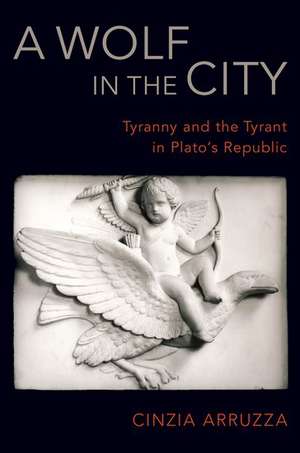A Wolf in the City: Tyranny and the Tyrant in Plato's Republic
Autor Cinzia Arruzzaen Limba Engleză Hardback – 8 noi 2018
Preț: 509.28 lei
Preț vechi: 586.41 lei
-13% Nou
Puncte Express: 764
Preț estimativ în valută:
97.48€ • 105.92$ • 81.94£
97.48€ • 105.92$ • 81.94£
Carte disponibilă
Livrare economică 19-25 martie
Preluare comenzi: 021 569.72.76
Specificații
ISBN-13: 9780190678852
ISBN-10: 0190678852
Pagini: 312
Dimensiuni: 213 x 147 x 31 mm
Greutate: 0.44 kg
Editura: Oxford University Press
Colecția OUP USA
Locul publicării:New York, United States
ISBN-10: 0190678852
Pagini: 312
Dimensiuni: 213 x 147 x 31 mm
Greutate: 0.44 kg
Editura: Oxford University Press
Colecția OUP USA
Locul publicării:New York, United States
Recenzii
Arruzza brings to light important differences between democracy and liberalism (p. 99). Freedom and popular rule do not always go together, and through the cracks of this relation the wolf may well appear. This is, to my view, a precious contribution Arruzza makes both to Platonic scholarship and to the understanding of our own time.
a fine and entirely commendable book on Plato's Republic. It provokes many questions and thoughts in interpreting Plato's political philosophy from a refreshingly new angle.
In sum, this is an excellent book. It feels genuinely original and fresh. Its main claims are based on meticulous analysis of the relevant texts. Relevant scholarly literature is closely engaged, and yet, thankfully, such engagement does not bog down the discussion. The writing is crisp and clear, and the argument moves briskly. The book can safely be recommended to anyone interested in Plato's Republic, his political philosophy, his moral psychology, or classical political thought more generally.
In her analysis of the textual details of theRepublic, Arruzza's work is masterful. She carefully handles everything from the historical minutiae of aristocratic clubs, to analyses of Plato's biological and animal metaphors.
[The book] is major contribution to scholarship. Its detailed analysis of the psychological condition of the tyrant is the fullest and best treatment we have of this subject. Its setting of Plato's portrait into its literary and political context is equally impressive and valuable. It is a book that should be read by every scholar and student of Plato's moral and political philosophy.
Summing up: Recommended
a fine and entirely commendable book on Plato's Republic. It provokes many questions and thoughts in interpreting Plato's political philosophy from a refreshingly new angle.
In sum, this is an excellent book. It feels genuinely original and fresh. Its main claims are based on meticulous analysis of the relevant texts. Relevant scholarly literature is closely engaged, and yet, thankfully, such engagement does not bog down the discussion. The writing is crisp and clear, and the argument moves briskly. The book can safely be recommended to anyone interested in Plato's Republic, his political philosophy, his moral psychology, or classical political thought more generally.
In her analysis of the textual details of theRepublic, Arruzza's work is masterful. She carefully handles everything from the historical minutiae of aristocratic clubs, to analyses of Plato's biological and animal metaphors.
[The book] is major contribution to scholarship. Its detailed analysis of the psychological condition of the tyrant is the fullest and best treatment we have of this subject. Its setting of Plato's portrait into its literary and political context is equally impressive and valuable. It is a book that should be read by every scholar and student of Plato's moral and political philosophy.
Summing up: Recommended
Notă biografică
Cinzia Arruzza is Associate Professor of Philosophy at the New School for Social Research in New York. She works on ancient philosophy and Marxist and feminist theory. She is the author of Plotinus. Ennead II 5. On What is Potentially and What Actually (Parmenides, 2015); Dangerous Liaisons. Marriages and Divorces of Marxism and Feminism (Merlin Press, 2013); Les Mésaventures de la théodicée. Plotin, Origène et Grégoire de Nysse (Brepols Publishers, 2011).
